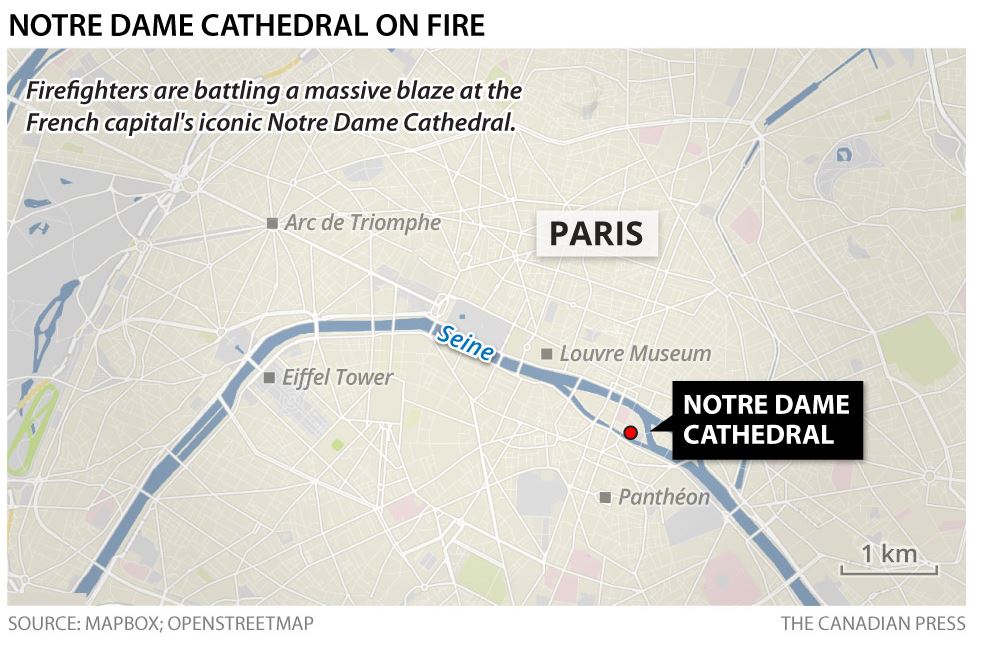As flames ripped through the Notre Dame Cathedral at the heart of the French capital, France’s president, Emmanuel Macron, tweeted a reminder of the famed cathedral’s significance.

“I’m sad tonight to see this part of us burn,” Macron wrote.
Around the world, eyes are fixed to videos of the flames engulfing the spire and, slowly, toppling it. The cathedral is centuries old and hosts some 12 million visitors every year. That’s because it isn’t just a religious symbol, nor is it even just a French symbol, says Paul Cohen, an associate professor of history at the University of Toronto, who is half French.
To talk about the cathedral from a historian’s perspective is almost too difficult, Cohen says. “My historian hat is scrambling for distance and critical perspective,” he says, but the Parisian in him is winning out.
“The sense of loss among Parisians and French people is enormous,” he said. “But we should also emphasize: I don’t think this necessarily means French people are feeling this as a religious loss.”
That’s part of the magic of Notre Dame, Cohen says. What was built as a Catholic cathedral has evolved into so much more, although it is still an active church.
- Lindsey Vonn crashes in Winter Olympic downhill, taken away by helicopter
- Venezuela frees several opposition members after politically-motivated detentions
- Bodies found in area in Mexico where search is on for 10 missing workers from Canadian mine
- Israel team, JD Vance booed at Olympics opening ceremony
WATCH: Paris sky filled with smoke as Notre Dame Cathedral burns

“We can find a whole host of ways in which it’s been mapped into French culture,” he says.

Get breaking National news
Think of Victor Hugo’s 1831 novel, Notre Dame de Paris. Think of the church’s spire in film. Think even of Quasimodo, ringing the bell in Disney’s The Hunchback of Notre Dame.
It’s even more than that, says Adam Cohen, an art history professor at the University of Toronto. Supporting the church was a way to help “shape the idea of a French kingdom” in the late 13th and early 14th centuries. So even though France has been a democratic secular state since the French Revolution, Cohen says, “the reason people are so distressed is because it’s a cultural monument that is really tied up with the development of the idea of a French nation.”
WATCH: The loss of the Notre Dame in Paris on Monday sent shockwaves across the world.

It’s also the building itself.
Old Gothic structures were “build to be sites of mass religious social experience,” Cohen says, in a way that’s easily translated to non-religious mass social experiences now.
“[Notre Dame] was designed to inspire awe and to pull your gaze upwards, to think about things transcendent, whether it was God or the Catholic version of Christianity or the transcendent power of human engineering and ingenuity.”
Cohen says his mother grew up in the Second World War in France and that she remembered seeing great monuments reduced to rubble.
As a historian, Cohen acknowledges how much Notre Dame has been lovingly renovated over the centuries, even narrowly escaping destruction in 1944 when a German commander disobeyed an order from Hitler to destroy French monuments.
“It’s not something one thinks is possible but of course it is possible,” Cohen says.
“It will prove to be an incalculable loss.”
WATCH: Multiple angles show iconic Paris landmark engulfed in flames

— with files from Rebecca Joseph









Comments